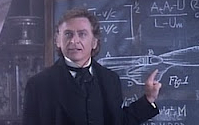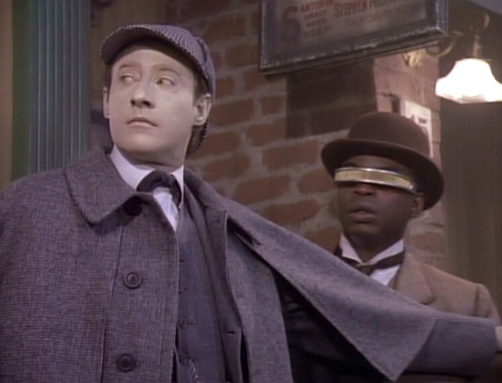I’m examining the impact Star Trek: The Next Generation had on my formation. The introduction to this series can be seen here.
When Geordi attempts to prove Data’s creative thinking abilities to Dr. Pulaski, a recreational holodeck tour through the Sherlock Holmes canon turns dangerous.
 This is an intriguing twist on the “holodeck malfunction” trope: it’s not actually a malfunction. In looking for ways to challenge Data’s mystery-solving skills, Geordi asks the computer for an opponent capable of defeating him… not of defeating Holmes, but of defeating Data. The computer responds by creating a holodeck character capable of conceiving of the concept that he is a holodeck character; he achieves self-awareness. He’s also Holmes most nefarious nemesis: Professor Moriarty. This creates a delightfully complex look at the line between non-sentience and sentience, and what is necessary for the creation of an entity that crosses that line.
This is an intriguing twist on the “holodeck malfunction” trope: it’s not actually a malfunction. In looking for ways to challenge Data’s mystery-solving skills, Geordi asks the computer for an opponent capable of defeating him… not of defeating Holmes, but of defeating Data. The computer responds by creating a holodeck character capable of conceiving of the concept that he is a holodeck character; he achieves self-awareness. He’s also Holmes most nefarious nemesis: Professor Moriarty. This creates a delightfully complex look at the line between non-sentience and sentience, and what is necessary for the creation of an entity that crosses that line.
It’s a delight to watch Data and Geordi learn how to hang out with each other in their off time. Initially, Data’s familiarity with the Holmes stories ends the adventures long before Geordi has had any fun. They are already on their way to discovering an answer, when Pulaski’s pointless prejudice is injected into the situation. She insists that Data has the limitations she decided upon before meeting him, and again refuses to consider input from him or his friends. She even goes so far as to say that creative thought would be dangerous for him, that “his circuits would short out at true mystery”. It’s an intrusion unnecessary to the plot point of building the Moriarty character, and only serves to place her in position to be a damsel in need of saving later.
Both Data and Moriarty are case studies in sentience, but they are otherwise stark contrasts in character. Much of the episode hinges on Moriarty’s ambition. Moriarty offers the observation that he is “no longer what I was created to be”. He takes more and more power from the ship to get Picard’s attention, and seems to grow stronger with the accumulated knowledge. When he discovers he cannot leave the holodeck, he chooses continuing consciousness when the embodied creatures leave, risking an unknown state (and possible death) with a hope that he can someday move about freely. But, in many ways, it is not in Data’s nature to seek out challenges; he originally pursues the holodeck activity simply to immerse himself in the stories of Holmes and savor them. It’s Geordi and Pulaski who argue about his nature, and change the situation to test him. When his colleague is in trouble, Data puts his prodigious intellect to the task; we’ve seen Data problem-solve, and know his skill. We also learn here that it takes a sentient foe – who happens to be a mastermind – to have the potential to best him. But Data just doesn’t have a drive to prove himself, which Pulaski misreads in this episode as lack of creativity. I read it as more… Taoist. I’m now wondering how he may connect to my fondness for mindfulness.
1. Data and Geordi from http://memory-beta.wikia.com/wiki/2365
2. Moriarty from http://fersforum.blogspot.com/2011/01/star-trek-next-generation-elementary.html

Leave a Reply